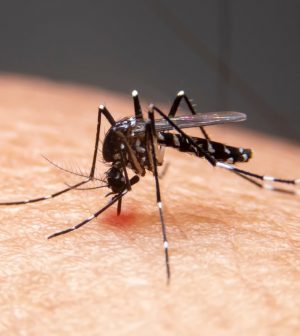- Could Your Grocery Store Meat Be Causing Recurring UTIs?
- Are You Making This Expensive Thermostat Error This Winter?
- Recognizing the Signs of Hypothyroidism
- 10 Strategies to Overcome Insomnia
- Could Artificial Sweeteners Be Aging the Brain Faster?
- Techniques for Soothing Your Nervous System
- Does the Water in Your House Smell Funny? Here’s Why
- Can a Daily Dose of Apple Cider Vinegar Actually Aid Weight Loss?
- 6 Health Beverages That Can Actually Spike Your Blood Sugar
- Treatment Options for Social Anxiety Disorder
Mosquitos: Get Them to Buzz Off

It’s that time of year when mosquitoes are at their peak, buzzing around barbecues and stinging at will.
But you don’t have to become their next victim, says one expert who offers tips on how to avoid being bitten.
Dr. John Wolf, a professor of dermatology at Baylor College of Medicine in Houston, says it comes down to preparation.
First, if you plan to be outside, know that mosquitoes are most abundant at dawn and dusk, so you might want to avoid working in your yard at those times. If you do venture out, wear loose-fitting clothes made of lighter fabrics that have long sleeves and pants.
“Wearing bright-colored clothing, cologne or perfume will attract mosquitoes to you,” Wolf warned.
Now, how can you make your yard less attractive to these pesky insects?
Mosquitoes breed in water, so empty any pots, containers or wagons on your property that have standing water in them.
What about bug zappers?
“They’re not very effective,” Wolf said in a Baylor news release. “While they may kill some mosquitoes, they actually kill a lot more useful insects like butterflies or dragonflies.”
Some people choose to use homemade bug repellants. Natural scents and plants like lavender, eucalyptus, lemon or lemongrass, cedar or citronella are commonly used, but Wolf said they may not always work.
The most effective mosquito repellants contain up to 30% DEET or picaridin.
“While there is no perfect way to avoid mosquito bites, repellants with these ingredients are proven to be safe, reliable and effective,” he said. “DEET, specifically, is approved for adults and children over 2 months.”
Products with up to 30% DEET can guard against bites for nearly 10 hours, but they shouldn’t be applied to the face because they can irritate the mouth and eyes, Wolf said.
If you plan to use a repellant with DEET and sunscreen, Wolf advised applying the sunscreen to your skin first, and then apply the bug spray.
“We don’t recommend using a product with a combination of sunscreen and a repellant with DEET. This is because, with sunscreen, you should reapply it every two to four hours. DEET should only be applied once or twice a day,” Wolf explained.
If all these prevention efforts fail and you are bitten by a mosquito, Wolf recommended using a cold compress or an ice pack to reduce swelling and itching. You can also try an over-the-counter hydrocortisone lotion or cream or an antihistamine.
If you have a serious reaction to a mosquito bite, go to an urgent care facility or an emergency room, Wolf advised.
SOURCE: Baylor College of Medicine, news release, Aug. 13, 2024
Source: HealthDay
Copyright © 2026 HealthDay. All rights reserved.










